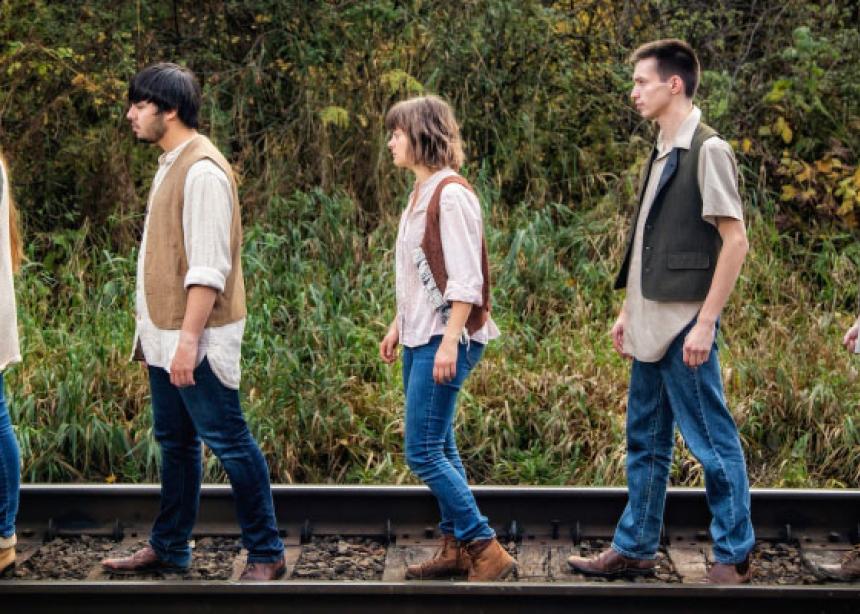One of today’s most pressing social issues came to life onstage late last year at Trinity Western University (TWU) with the world premiere of the original drama, disPLACE: Refugee Stories in their Own Words. The play was presented through Dark Glass Theatre in association with the university’s Humanitas Anabaptist-Mennonite Centre.
University theatre personnel sifted through more than 20 hours of audio interviews in order to find the words to use in the drama.
“The script was created through a collaborative process that included my actors, stage manager, assistant director and me,” says Angela Konrad, artistic director of the newly formed Dark Glass Theatre and chair of TWU’s School of the Arts, Media and Culture. “The words for the monologues were verbatim testimony of the refugees; scenes and songs included quotations and were inspired by refugee experiences, both those we interviewed and some from the broader conversation.”
Experiences portrayed included the horrors of death and torture that refugees had fled, and the difficulties they faced when they settled in their adopted land of Canada.
Five actors portrayed a variety of refugees from various settings, from Mary and Joseph arriving in Bethlehem and continuing to the post-Second-World-War Russian Mennonite experience in Europe. Also portrayed were modern-day people fleeing Colombia, Congo, Iraq and Syria.
The actors also performed vocal and instrumental music that had been composed for this production.
In one scene, one of the actors recited oft-heard excuses people give for not helping refugees settling in Canada today.
Knowing that all the refugees’ stories were true made them all the more powerful. “You can’t tell these stories without [noting] their resilience,” said Konrad. “These are real people.”
Humanitas Anabaptist-Mennonite Centre, which has ties to TWU, is the umbrella organization for Dark Glass Theatre and will continue to support the company’s future productions.
“In our view, the theatre initiative in general, and refugee stories in particular, connect with our mandate to develop and connect an Anabaptist-Mennonite perspective to both the academy and the lived experience of people,” says Myron Penner of TWU’s faculty of humanities and social sciences, and the director of Humanitas.
The mandate of Dark Glass Theatre is to tell stories “that enable us to see, face to face, people we might not otherwise meet, thereby decreasing judgment, increasing compassion and fostering empathy,” says the Dark Glass Theatre website. “We aspire to tell stories that build bridges between groups or individuals separated by discord or trauma, and to equip individuals to explore and express their own stories of forgiveness and healing.”
The Humanitas Anabaptist-Mennonite Centre is the product of a partnership between the Mennonite Faith and Learning Society and TWU. The Society is a registered non-profit organization that exists to promote Mennonite studies in higher education through establishing chairs and research centres at Canadian universities; it has partnered with TWU to establish this multi-disciplinary research centre focussed on bringing an Anabaptist-Mennonite perspective to addressing today’s challenges and pressing issues, and fostering research and teaching on Anabaptist-Mennonite history, practice and values.




Add new comment
Canadian Mennonite invites comments and encourages constructive discussion about our content. Actual full names (first and last) are required. Comments are moderated and may be edited. They will not appear online until approved and will be posted during business hours. Some comments may be reproduced in print.